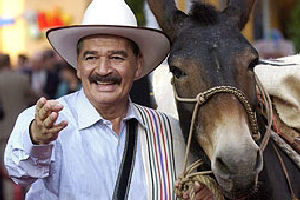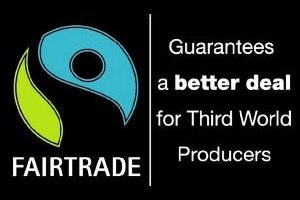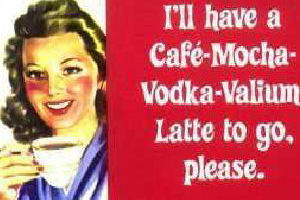Eschewing the Coffee Snobs
 Contrary to the assertions of marketing executives, corporate ne'er-do-wells, celebrity spokespersons and the barista at the local coffee shop, you do not need an advanced degree in ethics to buy a cup of coffee. Inasmuch as I'm hopeful that Juan Valdez and his family aren't subjugated, impoverished and forced to eat donkey meat as a consequence of my coffee drinking habits, there are really only two things I consider when I buy a cup of coffee. "One... what does it taste like? And two... how much does it cost?" The litmus test for assessing the coffee's value is, in my view, quite a simple one. If it doesn't taste like it''s been siphoned from the radiator of a '63 Rambler and buying a cup didn't require a third mortgage on the house then, in my books, it qualifies as a good cup of coffee. Just in case you're not following the bouncing ball: the only thing worse than a bad cup of coffee, is an expensive cup of coffee that tastes like shit.
Contrary to the assertions of marketing executives, corporate ne'er-do-wells, celebrity spokespersons and the barista at the local coffee shop, you do not need an advanced degree in ethics to buy a cup of coffee. Inasmuch as I'm hopeful that Juan Valdez and his family aren't subjugated, impoverished and forced to eat donkey meat as a consequence of my coffee drinking habits, there are really only two things I consider when I buy a cup of coffee. "One... what does it taste like? And two... how much does it cost?" The litmus test for assessing the coffee's value is, in my view, quite a simple one. If it doesn't taste like it''s been siphoned from the radiator of a '63 Rambler and buying a cup didn't require a third mortgage on the house then, in my books, it qualifies as a good cup of coffee. Just in case you're not following the bouncing ball: the only thing worse than a bad cup of coffee, is an expensive cup of coffee that tastes like shit.
Of course flavour and cost are qualitatively subjective attributes. Moreover, they depend entirely on the resources and predilections of the individual. I have little doubt there are legions of pretentious coffee-snobs who view my Tim Hortons patronage as common, blue-collar, ill-informed or, in the extreme, downright heathen. After all, according to one cited source, Tim Hortons does NOT engage in the sale of Fair Trade coffee. Mercifully, as the fair trade coffee-snob twits sip their frothing chemical-laden crappachinos through plastic lids convinced they've reached Valhalla, I gain solace in the knowledge that I can buy a predictably consistent cup of swill with a single Canadian coin and get change back.
I suspect the average coffee consumer has a limited knowledge about coffee, its history and the economic underpinnings surrounding its trade. And while I'd hope that the baristas at the local coffee shop would be somewhat knowledgeable about the product they sell and serve on a daily basis, I'd bet half my stuffed armadillo collection and two bottles of Wild Turkey that the vast majority of them couldn't tell you what Kopi Luwack is, where it comes from or why it's singularly the world's most expensive coffee. Within the industry, Starbucks is the largest coffeehouse chain in the world, boasting some "20,891 stores in 62 countries, including ... 1,324 in Canada". The company's official corporate ethics policy includes, among other things, a Responsibly Grown Coffee commitment which seems to suggest that the bulk of coffee purchased by Starbucks is Fair Trade Certified coffee.

Fair trade coffee is defined on Wikapedia as "coffee that is certified as having been produced and marketed to a stated set of standards". Consumers "pay a higher price when buying coffee with the certification logo or brand in the belief that, by doing so, they are helping farmers in the Third World". Of course the operative words in that description are: "in the belief that". Some people will not walk under a ladder or allow a black cat to cross their path in the belief that, by so doing, they will somehow be inundated with bad fortune. It's hardly surprising, then, that some consumers buy fair trade coffee in the belief that they are helping farmers in Third World countries. Proponents of the fair trade scheme argue that without the demand for higher-cost premium coffee, low commodity prices will either force growers off their lands or force them into growing coca leaves as an alternative cash crop. Critics of the fair trade scheme, on the other hand, have suggested that while "the idea was to prevent [growers] from being exploited ... the reality is that in practice, Fair Trade just makes exploitation easier." Other notable writers, such as Dr. Victor Claar of Acton Univerity, consider whether the fair trade scheme helps or hinders growers. Claar's thoughtful and provocative book, Fair Trade? Its Prospects As A Poverty Solution, "raise significant economic and moral questions about both the logic and economic reasoning underlying the fair trade coffee movement. The question, then, remains... does fair trade coffee really benefit third world farmers? Or is fair trade merely a marketing mechanism which effectively serves to perpetuate a more palatable form of indentured servitude? You be the judge...
Black Coffee, a 2007 Canadian documentary, examines the complicated history of coffee and details the political, social, and economic influence from its early origins to the present. Part 1 of the trilogy, The Irresistible Bean, (featured left) traces the emergence of coffee from Ethiopia, and extending out and around the globe. The second installment in the series, Gold In Your Cup, examines the coffee barons of the nineteenth century and the growth of the coffeehouse culture. The final episode of the trilogy, The Perfect Cup, examines the present romantic age of coffee and considers what entrepreneurs have done to enhance or diminish, depending on your view, the pursuit of that perfect caffeine fix.
 Make no mistake about it: coffee is a drug. And who, do you suppose, could be more knowledgeable about drugs than Tim Horton himself? The autopsy performed on his body, the day after being jettisoned from his DeTomaso Pantera sports car, indicated that he had traces of Dexamyl and a blood alcohol level of 0.17 at the time of the accident. Mercifully, I don't ply my body with bennies and booze but I must admit... until the caffeine from that second cup of coffee is cursing through my veins I'm about as sharp as a bowling ball.
Make no mistake about it: coffee is a drug. And who, do you suppose, could be more knowledgeable about drugs than Tim Horton himself? The autopsy performed on his body, the day after being jettisoned from his DeTomaso Pantera sports car, indicated that he had traces of Dexamyl and a blood alcohol level of 0.17 at the time of the accident. Mercifully, I don't ply my body with bennies and booze but I must admit... until the caffeine from that second cup of coffee is cursing through my veins I'm about as sharp as a bowling ball.
For the most part, I drink my coffee at home, in the morning, and BEFORE I head out the door. On the rare occasion, when my daily ritual is interrupted by other inconveniences, I find myself en route and unmedicated. Fortunately, whether I'm travelling by bus or car, there's a Tim Hortons a mere ten minutes away. And while I have little doubt that loyal Starbucks patrons would argue that the coffee at Starbucks is qualitatively superior to that of Tim Hortons, there are several reasons why I'd choose Timmy's every time.
First, I make no qualitative distinction between "something that's good" and "something that's good enough". If a cup of coffee passes the minimum "tastes good" threshold, then the only relevant factor remaining is cost. I either like the cup of coffee, or I don't and semantic "this one tastes better" quibbles only becomes an issue if they're the same price. If they're not the same price, it's sorta like saying "A new Ferrari smells better than a new Chevy because it costs more". In reality, they both smell like a new car.
But there are other, more subtle reasons why I prefer Timmy's over Starbucks. Frankly, it really pisses me off when I pay a premium price for coffee and then be expected to put my own cream in: generally from an empty cream dispenser. More often than not, the only cream/milk containers that have anything in them are the low fat or skim containers. If I was that health conscious, I wouldn't be drinking coffee out of a paper cup with a plastic lid. Somehow I suspect I'm getting more carcinogenic exposure to toxins from the coffee cup than I could possibly get from good old 18% cream. Hell, I'd venture a guess that suckling rigtht from the cow's tit would be healthier. But my disdain for Starbucks goes much deeper than having to put my own cream in from an empty container.
I've also noted that, generally speaking, the washrooms at Tim Hortons are remarkably clean and well-maintained. The last time I went into the unisex washroom at my local Starbucks, I thought I should have been wearing a hazmat suit before I went in and that I should have received a tetanus shot when I came out. Fer crissakes, I've seen cleaner outhouses at hunt camps. I can only surmise that cleaning the washroom is not in the average baristas job description.
And why is it so difficult to find a seat at a Starbucks? It's not as though I see patrons lined up out the door. What I do see are gaggles of pretentious gits, tapping away on tablets and smartphones, whose empty cup of flavoured beverage sits on the table in front of them as they spend countless hours texting monosyllabic grunts from their PDAs. Actually, it's somewhat ironic that the vast majority of products on the Starbucks menu aren't actually coffee.
Starbucks is not without opportunity though. I can envision some real possibilities just waiting to be exploited. I'm thinking a concealed pocket WiFi signal blocker might provide hours of entertainment as frustrated patrons, unable to update their Facebook status, twitch and spasm nervously. Anyone know where I can buy one for under twenty bucks?
Submitted by Norm de Plume, 30 April 2014